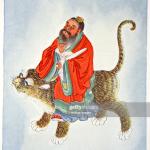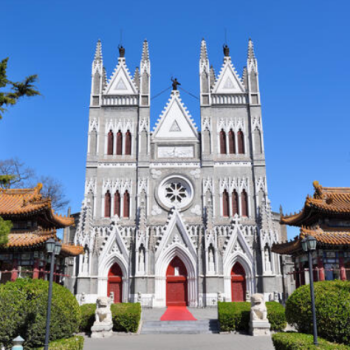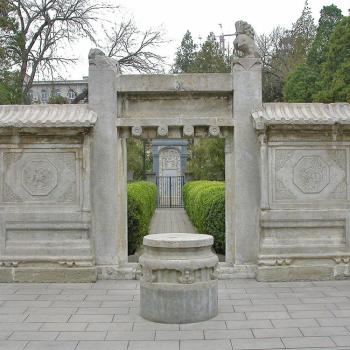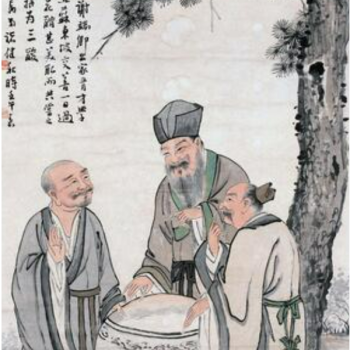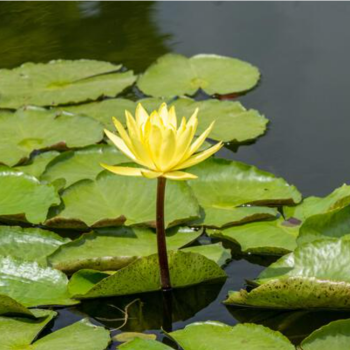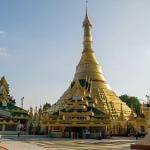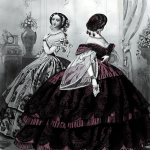
Recently, I have found myself turning back to that great monument of Chinese literature, the Romance of the Three Kingdoms. This novel, which has served as the national epic of the Chinese people for seven hundred years and is based on a story tradition dating back even further, is a fictionalized retelling of historical events from the second and third centuries of the common era. It is best known in the Western world for inspiring a number of video games, most notably the Dynasty Warriors series—which seems to be having a moment, if the number of gameplay videos I’ve seen popping up on YouTube is any indication. But, with its massive scope, memorable characters, and complex narrative, the novel is an impressive work of art in its own right. Indeed, the famous mantra describing the Mahabharata could just as fittingly apply to the Romance of the Three Kingdoms: “What is not there is not anywhere.”
One of the novel’s most famous stories has been very much on my mind of late. In chapters 37 and 38 of the novel, the benevolent and kindhearted lord Liu Bei sets out to seek the services of the Taoist mystic Zhuge Liang. After visiting the sage’s hut two times in the dead of winter and failing to meet him, Liu Bei returns a third time and, because of his extraordinary persistence and devotion, Zhuge Liang agrees to become his advisor. It is one of the enduring tales of Chinese literature and it is easy to see why. From the atmospheric power of the winter storm that envelops the action to the hints of conflict as Liu Bei’s brothers express skepticism toward his errand and the touches of humor when Liu Bei keeps running across Taoist sages who are not Zhuge Liang, it is truly a masterpiece of storytelling.
Without question, the purpose of the whole sequence is to introduce Zhuge Liang in a suitably grand and memorable fashion. And it works; generations have been captivated by the aura of wisdom and mystery that surrounds the sage from his very first appearance. In my more recent readings I find, however, that there is another figure in this story, one of the Taoist mystics Liu Bei encounters along the way, who is just as captivating. While Zhuge Liang essentially becomes the novel’s de facto protagonist, this individual flits into view only briefly and then disappears forever. But his brief appearance is enough to make him into one of the novel’s most memorable characters—and since there are over a thousand of those, that is saying something.
His name is Cui Zhouping and he is the first recluse that Liu Bei meets in his search for Zhuge Liang. When Liu Bei encounters him outside Zhuge Liang’s hut during the first visit, he is impressed with Cui’s Taoist accoutrements and—beginning a pattern that will continue with every other recluse he meets—mistakes him for Zhuge Liang. Cui Zhouping quickly corrects him and asks why he wants to meet with Zhuge. Liu Bei explains that he wants Zhuge Liang to help him reunite China and end the civil wars and division plaguing the land. In response, Cui has this to say:
You’re a thoughtful and kind man seeking to bring peace and order to the land, but let’s be frank. Ever since time began, the world has swung between order and chaos. Just think. Ever since the uprising that overthrew the Qin dynasty and the Han dynasty emerged, it has been order replacing chaos. For two hundred years all was well until Wang Mang rebelled, and the world descended into chaos. The overthrow of Wang Mang brought order again. Now that another two hundred years of peace have passed, it’s inevitable that chaos is going to come once again.
We’re living right now in the time of great transition when order breaks down and chaos arises. Warfare is erupting in all four corners of the world. You just have to bear with this. To think you can restore peace at a time like this—well it’s nothing more than an illusion. The time isn’t yet right. So now you’re seeking Kong Ming [Zhuge Liang], hoping to persuade him to reform and repair time and the very seasons. You’re probably even hoping that he’s going to rebalance the universe! But you have to be aware that this is not possible, and to try to do so will just wear you out. As you know, those who go with the flow of Heaven will find all works well for them. Those who struggle against it have no rest. Whatever fate has in store will be—there is nothing that can stop that! (Penguin edition, pp. 186-87)
Liu Bei listens to Cui’s words but remarks that, as a member of the Han lineage himself, he is honor-bound to try and restore peace even if it is impossible. He then asks Cui to join his cause, to which the sage demurs, stating, “My uncultured nature has grown too fond of leisure’s freedoms to give thought to fame or success” (Moss Roberts’ edition, p. 666).
This scene is brief but accomplishes quite a bit. It sets up Zhuge Liang and Cui Zhouping as contrasting models for how a devout Taoist can respond to a crisis like the collapse of the Han Dynasty. Cui Zhouping is very much of a kind with the numerous recluses, wise men, and immortals that populate Taoist literature. The great sages of the tradition, such as Laozi and Zhuangzi, regarded the great causes of their own day as hopeless and wanted nothing to do with them. They chose instead to retire to the wilderness to seek perfect alignment with the Dao and the will of Heaven. Cui Zhouping imitates their example. Following the practice of wuwei (“non-action”) extolled in the Daodejing and the Zhuangzi, Cui decides that progress of events indicate a period of extended violence for China. Believing this to be Heaven’s will, he accepts it and avoids inserting himself in the great struggles of the time. To him, even the most heroic efforts to restore order are futile and so he prefers a life of “leisure’s freedoms” to the “fame or success” he might be able to achieve were he to apply himself to the task.
Zhuge Liang is different. He represents a branch of Taoism that is much less well-known today but is also very ancient and flourished during the Han period. This is the Huang-Lao school. While this school shared many of the mystical preoccupations—longevity, immortality, making one’s nature compatible with the Dao—common to the faith’s other branches, it departed from them by encouraging engagement with the political order and social causes of the times. In Huang-Lao belief, a monarch governing according to the principle of wuwei could bring peace to the land through his benevolent example. However, he needed a sage who could instruct him in non-action and serve as the model that he himself could follow. This is precisely the role that Zhuge Liang sets out to fill for Liu Bei. Indeed, it is the role Liu wants filled; from their first meeting, he refers to Zhuge Liang as “master” and promises, “I will listen obediently to your enlightening instruction” (Moss Roberts’s edition, 681). In hindsight, it seems like a fated match. While the pairing up of an instructive sage-advisor with a benevolent and receptive ruler is archetypal in Chinese thought and long predates them, Zhuge Liang and Liu Bei have become the most visible embodiment of the idea in Chinese popular culture.
Thus, Zhuge’s Taoist solution to the problems of the times is very different than Cui’s own. For all of Liu Bei’s trials, it is only his final, plaintive cry of, “But what will become of the people?” (Penguin edition, 191) that finally convinces the sage to leave the happiness of his reclusive life for a future of struggle and war. This demonstrates Zhuge’s great compassion for the people; it is what moves him to confront the discord of the times and try to set it right. Involving as it does great self-sacrifice and an overriding concern for others, this certainly feels like the more admirable course of action. The novel also suggests that it is the correct one. When discussing the Taoist understanding of Zhuge Liang, Cui Zhouping, and the other recluses, the great sage Sima Hui remarks that, “Kongming, however, was the only one who contemplated the doctrine in its entirety” (Moss Roberts’s edition, 659). There is something special about Zhuge Liang’s nobility of character and concern for the people that sets him apart from more traditional Taoist sages such as Cui Zhouping.
Mao Zonggang, the novel’s great Qing-era editor and commentator, captured this sentiment perfectly when he contrasted Zhuge’s life and death with the careers of more traditional Taoist sages, “Kongming was not like Zuo Ci or Li Yi, invulnerable to death, a transcendent divine. Kongming was mortal, a worthy sage in the world of men….He did not make use of the unknowable and leave the world wondering. He made use of the knowable and left the world a model” (qtd. in Roberts’s edition, p. 2190, n. 8). More traditional sages give the world a mystery to ponder but Zhuge Liang left it with an exemplar to emulate, suggesting a greater historical legacy and more actual good done for the masses than a more resolutely reclusive sage could boast. There is something very appealing about the idea of a great sage returning from seclusion to share his wisdom with society as a whole and it has helped to given Zhuge Liang an impressive reputation that has remained undaunted for eighteen-hundred years.
And yet, for all that, Cui Zhouping is right.
Let us look at his speech again. Cui presents existence as being a constant alteration of two forces, order and chaos. In the political sphere, order leads to the founding of empires and periods of peace and harmony. However, every period of order must be followed by an equivalent period of chaos, during which disruption, warfare, and bloodshed reign supreme. Cui recognizes that China has just seen the end of a long period of order. Thus, the period of chaos that is now beginning must be equally as long. This means that it cannot be ended in a hurry—certainly not in the span of a single human lifetime. Nothing that Cui, Liu Bei, Zhuge Liang, or anyone else can do will be able to shorten it or bring it to a close. Thus it is better to let the chaos be for its natural duration and simply focus on the quality of one’s own life. Cui’s offhand remark about enjoying leisure too much to pursue success or fame may sound like the credo of a selfish hedonist. But it is not. It is an acknowledgement by Cui that he cannot change the world in any meaningful way and a promise to tend to what he can control, his life and personal situation. Given the circumstances he finds himself in, it is an eminently rational thing to do.
Nor is it the unorthodox belief of an eccentric sage. All Taoists of the time would have agreed with Cui’s theory to some extent. The inevitable transformation of one thing into its opposite over time is fundamental to Taoist belief; it is, after all, the process embodied in the famous yin-and-yang. So too is the notion that the world is governed by these transformations. What Cui does is apply this logic with brutal clarity to the political realm and the chances of any would-be hero who seeks to end the current strife. He is hardly the first Taoist thinker to do so. The main disagreement between Huang-Lao and other schools of Taoism was precisely on this point. Huang-Lao adherents, like Zhuge Liang, believed that the transformation of order into chaos could be halted and even reversed by human agency, particularly when that agency was exercised by a benevolent monarch and his sagely advisor. Taoists of what would become the more mainstream viewpoint held instead that the law of transformations was absolute and that no amount of human effort could hold back its workings.
Within the story-world of the Romance of the Three Kingdoms, it is the latter view that proves true. One way of reading the novel is as a test-case of the Huang Lao position: can an almost perfectly benevolent ruler (Liu Bei), guided and instructed by a truly wise and all-knowing sage (Zhuge Liang), reverse the coming of chaos and create a new age of order before its proper time? It turns out that they cannot, despite their best efforts. The striking thing is that before Liu Bei had even met Zhuge Liang and launched the great experiment, Cui Zhouping had already foreseen the result. Liu Bei, despite his kindheartedness and sincerity, will inevitably fail. Zhuge Liang cannot “rebalance the universe.” Their efforts will be in vain, as the age of chaos will end on its own schedule. When reunification does at last come, it will have nothing to do—as the novel’s final pages make abundantly clear—with benevolence or sagely wisdom.
In this sense, Cui’s speech functions as a kind of abstract for the novel as a whole. Indeed, Cui Zhouping is even wiser than the novel itself knows. Romance of the Three Kingdoms ends with the Jin Dynasty’s unification of China in 280 C.E., about a hundred years after the story began, and suggests that this will lead to a new, long-lasting period of order. Thus, the era of chaos seems brief compared to the four-hundred years of Han rule before it and what is implied to come after. Yet in actual history, unification lasted for only a few decades before chaos swept over the land once more. A true and lasting unity would only come about with the rise of the Tang Dynasty, founded roughly four-hundred years after the end of the Han. Thus, four hundred years of chaos did indeed follow four hundred years of order. This fact did not fit the thematic and temporal unity that the novel was trying to achieve, and so it goes unmentioned there. But it still lurks in the background for the informed reader, who must then see Cui Zhouping’s theory in a whole new light. Cui foretells the actual course of history perfectly, demonstrating an uncanny insight into the patterns of history than even the novel’s author is willing to acknowledge. One is left with the impression that Cui’s critique so thoroughly challenges common notions of unity, heroism, and duty to the state that even the narrative itself had to try and contain it. The Romance of the Three Kingdoms from start to finish engages in a precarious balancing act between celebrating heroism and loyalty to the state and demonstrating the actual futility of these things in a time of chaos. Cui Zhouping’s words, more than anything else in the novel, disrupt that balance and hint that the scales are weighted more toward futility than even the Romance itself is willing to admit.
Nor is Cui alone in checking the ambitions of the military-minded heroes by demonstrating that their efforts are insignificant compared to a life spent in search of mystical truth. After Guan Yu—the novel’s other great hero—is executed by Sun Quan for refusing to forswear allegiance to Liu Bei, his spirit wanders the earth and eventually encounters a Buddhist monk named Pujing. The monk is unimpressed by Guan Yu’s insistence that a great injustice has befallen him and chastises him, “retribution follows human action with the certainty of fate. Now you cry out for your head … From whom shall Yan Liang, Wen Chou, Cao Cao’s six pass guards, and countless others whom you killed seek their heads?” (Moss Roberts’ edition, 1376). The monk teaches him that even the most heroic life—Guan Yu had been acting righteously in all the mentioned engagements based on Chinese warrior ethics—inevitably creates the conditions of one’s downfall and must therefore be renounced. The text then tells us that “[i]n a flash Lord Guan realized the truth” (Moss Roberts’ edition, 1376). He achieves a state of renunciation and enlightenment, becoming the benevolent protector deity so beloved in Chinese culture. That being said, the fact that he uses his newly enlightened state to brutally murder the generals who had a hand in his death suggests that perhaps not all of the lesson took hold. Regardless, Pujing reinforces Cui Zhouping’s claim about the emptiness of heroics and outward-directed action, creating a persistent counter-narrative that raises questions about the novel’s own tendency to cast military heroism in a glorious light.
These scenes of Taoist recluses and Buddhist monks chastising the worldly focus of the novel’s heroes brings to mind similar moments in the Morte d’Arthur’s Grail Quest narrative— discussed in an earlier entry—in which priests and hermits inform the Knights of the Round Table that all their worldly chivalry means nothing in comparison to the holy and contemplative life. But while the hermits of the Morte denounce the violence, cruelty, and immorality hidden beneath the moral posturing of Camelot and Pujing does the same when he wonders why Guan Yu expects retribution for his own death but not for the deaths he himself has caused, Cui Zhouping goes farther than either. He takes a big-picture perspective that even Pujing, with his focus on personal karma, misses. For Cui Zhouping, the heroic life is futile not merely because it can corrupt a person or bring them to a tragic end. It is futile because, in the grand scheme of history, it does not change anything. Why try to be a warrior, an official, or any sort of public hero when your efforts are simply doomed to fail? He alone highlights the inconsequentiality of human efforts to alter history’s natural processes. And given how both the novel ends and history subsequently unfolded, we know that he is on to something. Cui, it must be admitted, has a fair point.
Thus, Zhuge Liang and Cui Zhouping emerge as representing two distinct and very different kinds of Taoist response to the collapse of Han rule in the second century. They also represent a more fundamental kind of opposition. Cui refuses to immerse himself in the struggles of the times and is thus, presumably, free to continue his life of leisure. Zhuge Liang, on the other hand, will “sweat out his heart’s blood” (Moss Roberts’s edition, 659) and die on campaign at the comparatively young age of 54, his life-force depleted by overwork and devotion to an increasingly hopeless cause. This harkens back to another ancient and archetypal conflict in Chinese literature, that which exists between the secluded, religious life that offers health and happiness at the cost of ignoring others’ wellbeing and the public life that brings stress and an early demise but benefits society as a whole. In Western terms, it could be called the distinction between the active and the contemplative life, with both having more extreme consequences than Western thinkers are usually willing to admit.
It is hard to say, from a reading of the novel itself, which is to be preferred. Certainly, Zhuge Liang is the most important character in the Romance of the Three Kingdoms. The stories about him have cast a long shadow over Chinese culture, such that he has become a culture hero credited with inventing everything from the wheelbarrow to the sky lantern and the mantou bun. Without question, his historical legacy has been greater than most people could ever hope for. Yet, few people would want their lives to unfold as his did, meeting death far from home with “the victory heralds yet to come” (in the poet Du Fu’s memorable phrase) and the sense that the work they gave their life to has come to nothing. By contrast, Cui Zhouping boasts almost no historical legacy to speak of. And yet, if the novel’s brief glimpse of him is any indication, he probably spent the remainder of his days in happiness and peace. Given the high premium our society places on happiness and fulfillment, Cui Zhouping’s life is the one that, if the choice was theirs to make, most people would undoubtedly choose.
The question of which life is ultimately better is not merely a Chinese or an Asian one. It has bedeviled the Western world at least since Achilles chose a short and warlike life, alongside an eternity of fame, over a long and peaceful but obscure one. In some sense, it also underlies much of the conflict between apocalyptic, revolutionary forms of religion and their more institutionalized, quietist counterparts. In Christianity alone, we see the apocalyptic, world-changing attitude of the first few centuries—with its call to face brutal death in order to make society ready for the fast-approaching Kingdom of God—transform into the institutional Church of the Middle Ages, with its focus on individual salvation and dedication to the status quo. Augustine legitimized this development by proposing a pessimistic theory of history that, while otherwise quite unlike Cui Zhouping’s, also left little room for individual humans to improve the world. Then in the twelfth century, Joachim of Fiore and his disciples would revitalize the faith’s revolutionary foundations with their own call to transform the world and ring in the “Age of the Holy Spirit,” thereby weakening the Church’s control, opening the door for the Protestant Reformation, and clearing a path for all that came after. Importantly, Joachim was only able to do this because of the new understanding of history and its processes that he pioneered, one in which human effort would actually determine the future course of history. In more ways than one, the conflict between the life of activity and sacrifice and that of privacy, retirement, and peace has defined the history of religions and that of the world itself. While that might seem like a struggle between two different lifestyles, what Zhuge Liang and Cui Zhouping—or Joachim and Augustine, for that matter—reveal is that it is more fundamentally a conflict between two contrasting narratives of history. In one narrative, individual humans are able to shape the future of the world but in the other, the movements of time are simply too vast for any one individual to have much impact at all.
That conflict is still with us today. We live in a time where the problems facing global society seem just as intractable as those that plagued second-century China. Things do not seem likely to get better in the foreseeable future. Old verities no longer hold true. Hard work is not rewarded and projecting an illusion of competence is generally more important than actually having it. Expending effort toward achieving something worthwhile, for oneself and for humanity, seems just as futile now as it did to Cui Zhouping all those years ago.
Zhuge Liang was one of the greatest individuals to ever live. Those who follow in those footsteps and make a positive difference in the world, especially at this time, have embarked on a noble and admirable course. And yet, over everything the question still hangs: what if Cui Zhouping was right?
A Note on Sources
Romance of the Three Kingdoms is the traditional English name of the novel, a loose translation of its shortened Chinese title, Sanguo yanyi. The original novel is traditionally attributed to Luo Guanzhong. Moss Roberts’s edition of the novel, Three Kingdoms (Beijing: Foreign Languages Press, 2003) remains the scholarly standard and has been my most important source. However, I consulted other versions of the novel as well for this entry, including the old Brewitt-Taylor translation and the more recent Penguin Classics edition undertaken by Martin Palmer, The Romance of the Three Kingdoms (London: Penguin, 2018). I have chosen to quote Palmer’s translation when it conveys the meaning of a passage more clearly than Roberts’s translation does. The most notable example of this is Cui Zhouping’s speech itself.
Anna Seidel’s article “The Emperor and His Councillor Laozi and Han Dynasty Taoism,” (Cahiers d’Extrême-Asie, vol. 17, 2008) was an invaluable resource on Huang-Lao Taoism, the religious background of the Han period, and the various social archetypes inherited from those times. Seidel’s article, interestingly enough, ends just at the moment of time where the Romance of the Three Kingdoms begins, in the reign of Emperor Huan.
The period of history covered by the Romance of the Three Kingdoms itself seems to have been quite a formative moment for Taoism and yet there seems to be little written about how the faith developed during this time. The millennialist overtones of events such as the Yellow Turban Rebellion are occasionally glanced at but the fact that the conflict between Liu Bei and Cao Cao over Sichuan reshaped the Celestial Master sect (and thereby determined the future history of Taoism itself) is rarely acknowledged. I intend to tell that story in our next entry.


